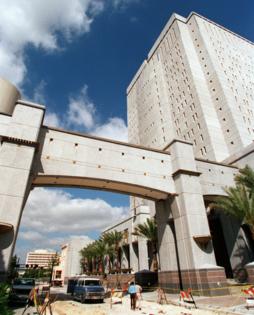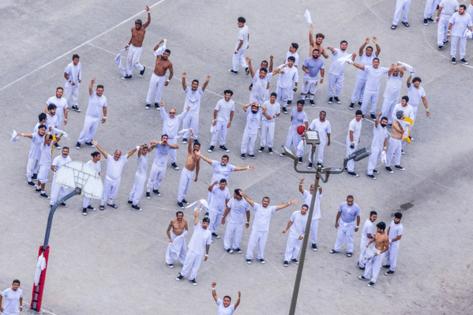Report finds 'dehumanizing' conditions in Florida immigration detention centers
Published in News & Features
MIAMI — Conditions in South Florida’s immigration detention centers during the Trump administration’s ongoing crackdown have been described as degrading and dehumanizing—violating international human-rights standards and the U.S. government’s own detention guidelines—in a newly released report by three advocacy organizations.
The 92-page report, “‘You Feel Like Your Life is Over’: Abusive Practices at Three Florida Immigration Detention Centers Since January 2025,” was released this week by Americans for Immigrant Justice, Human Rights Watch and Sanctuary of the South. It alleges widespread mistreatment of migrants detained at the Krome North Service Processing Center, Broward Transitional Center and the Federal Detention Center in Miami.
The organizations—an immigrant-rights law firm, a global human-rights watchdog and a worker-led collective—reviewed documents and interviewed 17 current and former detainees, along with family members and attorneys.
Detainees described extreme overcrowding, unsanitary conditions and abusive treatment by Immigration and Customs Enforcement officers and private contractors. “Some were shackled for prolonged periods on buses without food, water, or functioning toilets; there was extreme overcrowding in freezing holding cells where detainees were forced to sleep on cold concrete floors under constant fluorescent lighting,” the report states. “Many were denied access to basic hygiene and medical care.”
The U.S. Department of Homeland Security, Immigration and Customs Enforcement and Bureau of Prisons did not respond to the Miami Herald’s requests for comment.
Emergencies were ignored
Medical neglect was a central theme of the findings. Detainees with diabetes, HIV, asthma, kidney conditions and chronic pain reported being denied essential medications and doctor visits.
Among the cases described in the report:
▪ A man with chronic illness said he collapsed after being transferred from the Federal Detention Center in downtown Miami to the Broward Transitional Center in Pompano Beach without his required daily medication. His family discovered he had been hospitalized under a false name. He was returned to detention in shackles.
▪ One man said he coughed up blood for hours in a crowded cell. When detainees protested, a Disturbance Control Team stormed in, zip-tied them and forced them to lie face down on a wet floor. One detainee reported seeing an officer instruct colleagues to turn off the CCTV camera. Another said an officer slapped him.
▪ A man detained at Krome described collapsing from a strangulated hernia after being denied care. “The doctor told me if I had come in any later, my intestines would’ve ruptured,” he said. “I had to throw myself on the floor just to get help.” He said he also witnessed officers hogtie and beat detainees who refused to board a transfer bus after a peaceful protest.
▪ Two men said they were denied HIV treatment while detained at Krome. One, previously held at the West Miami-Dade facility in 2020 and provided daily medication, was re-arrested in February. Despite the facility having his medical records, he waited 12 days before seeing a doctor. Similarly, another man had to wait over 13 days to receive his HIV medication, causing his previously undetectable viral load to become detectable.
▪ Another woman described witnessing the death of Marie Ange Blaise, a 44-year-old Haitian woman in the Broward Transitional Center. “We started yelling for help, but the guards ignored us,” she said. “By the time the rescue team arrived, she wasn’t moving.”
Detainees said they were made to eat while handcuffed behind their backs, according to the report. They also described retaliation for seeking mental health support. At the Broward Transitional Center, they said, people who asked for help were placed in solitary confinement for weeks.
Women held at Krome, a facility meant for men, reported being confined without bedding or privacy. One woman recalled arriving late at night on Jan. 28 and being held for days in a cell that was typically used for intake procedures and had just one toilet covered in feces.
“People in immigration detention are being treated as less than human,” Belkis Wille, the report’s author and associate crisis and conflict director at Human Rights Watch, said in a statement. “These are not isolated incidents, but the result of a fundamentally broken detention system that is rife with serious abuses.”
Enforcement and Detention
Immigration detention has surged nationwide since the beginning of Trump’s second term, leading to overcrowding. In Florida, federal and state crackdowns have driven the detained population at Krome to nearly triple in three months. The Federal Detention Center, previously unused for immigration detention, began housing hundreds of immigrants earlier this year.
The report emphasizes that the current administration has shown that “any non-citizen, not just those with criminal convictions, are prone to apprehension and detention.” It highlights that the Department of Homeland Security exercises broad authority to detain and initiate removal proceedings against anyone out of lawful status.
This includes people who entered the country without authorization, overstayed tourist or work visas, had student visas revoked or lost temporary protections such as humanitarian parole or Temporary Protected Status after they expired or were terminated. The report contrasts this approach with that of Trump’s previous administration, which placed less emphasis on detaining and deporting non-citizens in these categories , instead focusing more narrowly on individuals with criminal records or those deemed national security threats.
The expanded scope of enforcement — and the proliferation of 287(g) agreements linking local police and corrections and federal immigration enforcement — is contributing to a “dramatic increase in arrests and detentions,” the report states.
Within a month of Trump’s second term, the number of people detained by ICE began to rise. Throughout 2024, an average of approximately 37,500 people were held in immigration detention each day. By June 20, that number had climbed to over 56,000 detainees on any given day—a 40 percent increase compared to June 2024, according to Human Rights Watch analysis of ICE data.
Advocates have raised serious concerns about detainee safety and access to basic services amid extreme overcrowding in Florida’s immigration detention facilities. At Krome, the number of detainees surged by 249 percent by March compared to pre-inauguration levels, with the facility at times holding more than three times its operational capacity, according to Human Rights Watch report.
By June 20, the total number of immigration detainees across the three facilities in Florida remained 111 percent above levels seen before President Trump’s return to office, underscoring the ongoing strain on the state’s detention infrastructure under the administration’s intensified immigration enforcement policies.
Human Rights Watch says it sent letters on May 20 and June 11 to ICE, the Federal Bureau of Prisons, and the private companies managing Krome and Broward Transitional Center, detailing their findings and requesting responses. It says only the company operating Krome replied, saying it could not comment publicly.
Echoes of previous reporting
The findings in the report echo conditions independently documented by the Miami Herald in recent months. The Herald interviewed three former Krome detainees, along with attorneys and family members of three others held at the west Miami-Dade complex. They described a facility pushed to the brink, with detainees living in distress.
Although Krome and other ICE-run detention centers are bound by strict standards covering medical, mental health, hygiene, legal access, abuse prevention and language services, immigration attorneys told the Herald that conditions at Krome are “the worst seen in 20 years” and have “risen to the level of an international human rights disaster.”
Another Herald investigation revealed last month that migrant detainees held at the Federal Detention Center in Miami are facing harsh and potentially rights-violating conditions. The facility, primarily designed for criminal defendants, is now also housing immigrants.
According to legal documents and interviews with detainees, Bureau of Prisons staff and attorneys, the center is plagued by crumbling infrastructure, frequent use of force and severely limited access to legal counsel. While some detainees say the basic living conditions are slightly better than those in nearby ICE-run detention centers, access to legal support is significantly worse. Detainees report difficulty in communicating with attorneys, making legal phone calls or preparing for court. These findings raise concerns about due process, since immigration detention is civil in nature and not meant to be punitive.
The government has expanded detention capacity to federal prisons. Under a February contract, ICE began placing detainees in five Federal Bureau of Prisons facilities. Legal documents and interviews reviewed by the Herald show these immigrants face harsh conditions, deteriorating infrastructure, and limited legal access—though in some cases, facilities are better maintained than traditional ICE centers.
A Feb. 7 letter from Bureau of Prisons administrators classified immigrant detainees as “pretrial inmates,” despite their civil—not criminal—status.
Recommendations
According to the advocacy organizations report, the abuses described violate ICE’s own Performance-Based National Detention Standards and National Detention Standards, as well as international obligations under the International Covenant on Civil and Political Rights, the Convention Against Torture and the UN’s Mandela Rules.
The report urges the federal government to scale back detention and adopt community-based alternatives that provide legal, housing, and healthcare support—especially for asylum seekers, people with disabilities and others in compliance with immigration proceedings.
It recommends that Congress repeal mandatory detention laws, reduce ICE funding and expand legal aid and oversight. DHS and ICE are called on to end the use of prisons, jails and private facilities for civil detention, improve medical care and increase transparency.
For Florida officials, the report recommends ending 287(g) agreements with local law enforcement and rejecting new detention contracts. It also calls on United Nations bodies to investigate conditions in U.S. immigration detention and hold the government accountable for rights violations.
©2025 Miami Herald. Visit at miamiherald.com. Distributed by Tribune Content Agency, LLC.














Comments